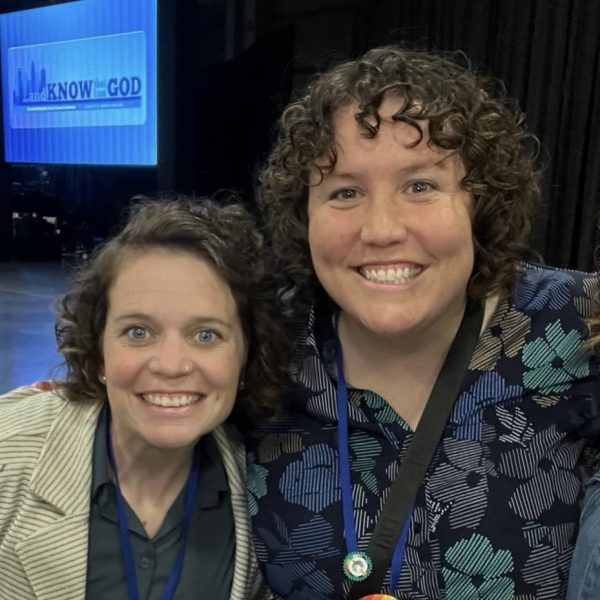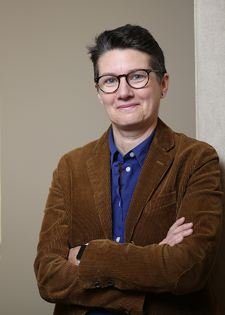
Vanderbilt Divinity School alumni who helped bring historic shifts to the United Methodist Church’s stances on sexuality credit a variety of learning experiences—in the classroom and in field education—for their preparedness as agents of social justice.
Carter Ellis, MDiv, ’13, was selected as a delegate to the UMC General Conference, which took place April 3–May 3 in Charlotte, North Carolina. “The goal for us who support LGBTQIA+ inclusion was to get to ‘neutral,’ so to speak, with UMC policies,” Ellis said. “We succeeded in removing harmful language, and in one or two instances, add protections for queer clergy, but it is by no means yet an explicitly inclusive policy.”
With the approved changes, United Methodist pastors can no longer be punished for performing weddings of same-sex couples. Queer clergy are able to go through the ordination process while being open about their sexual orientation or gender identity. Those ministers who had their credentials removed for being queer can apply to have them reinstated.

Ellis, who was skeptical about the church when she enrolled at the Divinity School, is grateful for witness from Divinity School faculty and staff who normalized what being queer and called to love and serve looks like. “We don’t see that witness very often in the church,” Ellis said. “So I carried those folks as leaders with me in my mind going forward.”
Ellis returned to her home state of North Carolina after graduation and received her first UMC appointment in the Western North Carolina Conference. She was ordained as an elder in 2017. Three years later she moved to Kansas City and took the courageous step of marriage with Lora Andrews, MDiv’14.
“We were immediately placed under complaint through the denomination, which could have been processed toward losing our credentials,” Ellis said. “Our bishops held us in what’s called ‘abeyance’ while we waited and prayed for changes in the Book of Discipline. If the delegates at the General Conference had not voted the way they did, we could have faced a trial to decide if we could continue being clergy. Our careers have been defined by this work for justice.”
Andrews, an ordained elder in the Great Plains (Kansas and Nebraska) Conference, attended this spring’s UMC General Conference as a member of its Queer Clergy Caucus and as a chaplain. She has advocated for removing discriminatory language targeting LGBTQIA+ clergy from UMC policies since her student days.

Religion and Social Movements, a course taught by C. Melissa Snarr, the E. Rhodes and Leona B. Carpenter Professor of Ethics and Society, helped shape the focus of Andrews’work. “In addition to learning about how the church organizes toward justice, we were required to volunteer with a social movement,” Andrews said. “I assisted Reconciling MinistriesNetwork with grassroots efforts in local United Methodist churches to advance justice and inclusion for LGBTQIA+ people. A decade later, I continue to apply what I learned in school to my ministry.”
Also attending the conference was Eric Burton-Krieger, MDiv’11, who is transitioning his ministry from Indianapolis to Atlanta, Georgia. In 2007, he was selected for the first class of the Cal Turner Leadership Scholars program, which supported master of divinity candidates pursuing UMC ministry. Burton-Krieger enrolled at Vanderbilt because he wanted an academically rigorous education. However, being part of a deeply supportive community was an additional benefit. “Organizing for justice is hard work, and it’s taken decades in our denomination. Those of us seeking affirmation and grace for LGTBQIA+ people were bitterly disappointed in the results of the 2019 conference. However, the lifelong friendships we developed in school have helped with our networking and organizing to change lives.”
“These tight-knit groups have provided a seedbed for the kind of patient, resilient, but also prophetic leadership that has been needed in the church,” Snarr said. “Any United Methodist student who enrolls here makes a clear choice about how they want to be trained in terms of the church’s future.” She also highlighted the work of the Carpenter Program in Religion, Gender and Sexuality to train future ministers in more open and affirming theological considerations and pastoral practices.
Burton-Krieger noted the influence of alumni/ae serving at Nashville area churches like Edgehill United Methodist and East End United Methodist. “They would share their Vanderbilt experiences with us students, but also talk about the impact of activism in their daily lives post-graduation,” he said.
Brandon Baxter, MDiv’17, senior pastor at East End United Methodist Church, credits his Divinity School education for helping navigate power dynamics and relationships within the denomination. Baxter, a lifelong Nashvillian, was instrumental in efforts to bring more diversity to the Tennessee-Western Kentucky delegation at this year’s General Conference.
Although Baxter was not able to attend the conference, he was excited to watch the results from afar. “I began collaborating with Sam McGlothlin, MDiv’16, and others after the 2019 conference to reimagine our delegation,” Baxter said. “We worked together to build an intersectional group of candidates with diversity in race, gender, sexual orientation and more.” McGlothlin, senior pastor at Belle Meade United Methodist Church, was among the delegates representing the Tennessee-Western Kentucky Conference.
Baxter previously served at West End United Methodist Church, where he helped create more public visibility around his congregation’s affirmation for LGBTQIA+ people, especially after the 2019 General Conference. “I felt it was important—with the congregation’s proximity to Vanderbilt and location on a main city corridor—to be clear about our affirming and welcoming community,” Baxter said. “In addition, our lay leadership expanded our wedding policy, making it fully affirming for same-sex couples. I was proud of the congregation for taking these major steps in its journey of faith.”
Even though these Vanderbilt Divinity alumni/ae were successful in helping to remove discriminatory language toward LGBTQIA+ people from the Book of Discipline, their work has only begun.
“So we have those protections in place, but most of that is on paper,” Ellis said. “Now it is seeing how individuals, churches, bishops and annual conferences live into this spirit on the ground. How do we change hearts and minds as opposed to simply words in our Book of Discipline? It was a huge step for us as a denomination, yet we’re compelled to continue the work in the spirit of inclusion.”